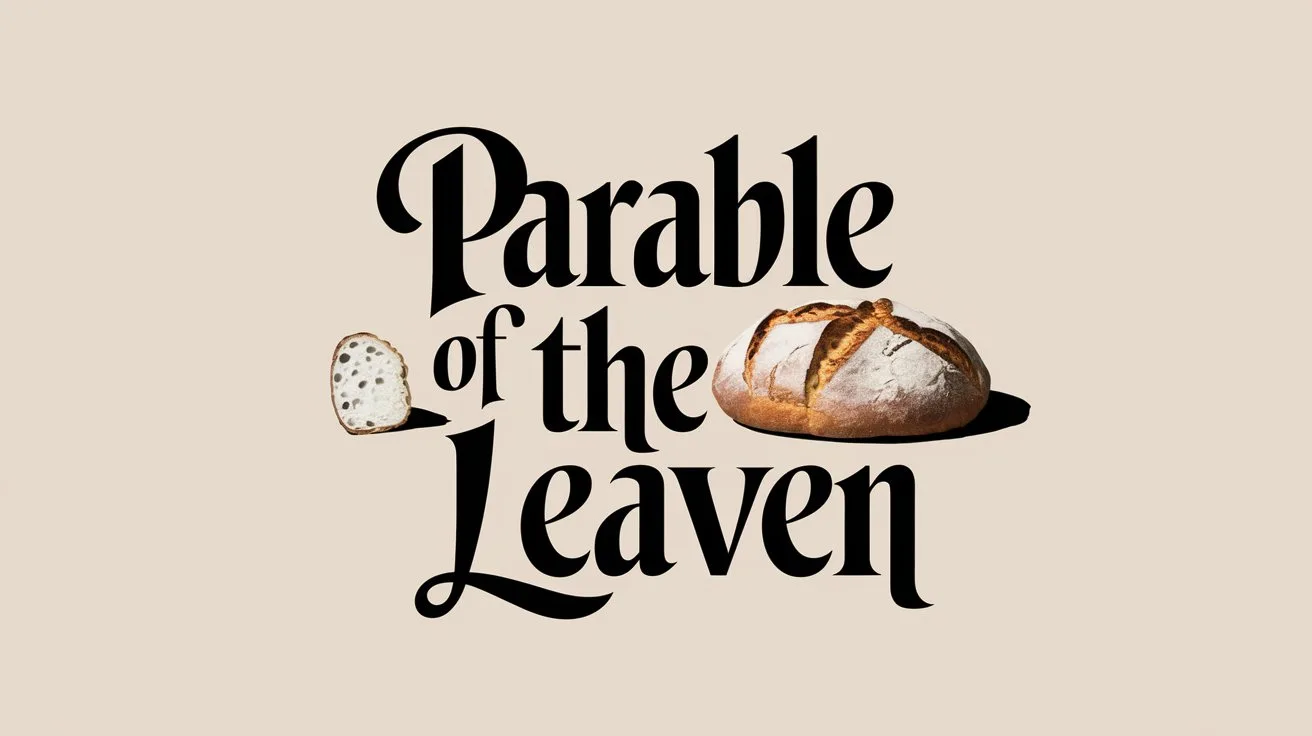Jesus often used simple, everyday things to illustrate deep spiritual truths. The Parable of the Leaven is one of His shortest parables, yet it carries profound meaning about the kingdom of God. It is recorded in two places:
“Another parable He spoke to them: ‘The kingdom of heaven is like leaven, which a woman took and hid in three measures of meal till it was all leavened.’” (Matthew 13:33)
“And again He said, ‘To what shall I liken the kingdom of God? It is like leaven, which a woman took and hid in three measures of meal till it was all leavened.’” (Luke 13:20-21)
Though it is just one verse long, this parable is packed with meaning about how God’s kingdom operates in the world and in our lives.
Understanding Leaven in the Bible
To fully grasp this parable, we need to understand what leaven represents in the Bible. Leaven is another term for yeast, a substance that, when mixed into dough, causes it to rise. It spreads invisibly, working through the entire batch of dough.
Most often in Scripture, leaven is associated with sin and corruption:
The Leaven of the Pharisees
– Jesus warned about the hypocrisy of the Pharisees, calling it leaven:
“Beware of the leaven of the Pharisees, which is hypocrisy.” (Luke 12:1)
Leaven and Sin
– Paul compared sin to leaven, warning that just a little can corrupt the whole:
“Your glorying is not good. Do you not know that a little leaven leavens the whole lump?” (1 Corinthians 5:6)
The Unleavened Bread at Passover
– The Jews were commanded to remove leaven from their homes during Passover, symbolizing purity and separation from sin (Exodus 12:15).
Because of these negative associations, some argue that leaven in this parable represents false doctrine or corruption spreading in the Church. However, the context of Jesus’ teaching in Matthew 13 and Luke 13 points to a positive meaning of leaven: the expanding influence of the kingdom of God.
The Meaning of the Parable
Jesus likens the kingdom of heaven to leaven that is hidden in three measures of meal until it permeates the whole lump.
The Kingdom of God Starts Small but Grows Powerfully
Leaven begins as a small amount, just as God’s kingdom started small with Jesus and His disciples. Yet, it spread throughout the world and continues to grow.
This is similar to the Parable of the Mustard Seed (Matthew 13:31-32), where Jesus describes the kingdom as a tiny seed that grows into a massive tree. The kingdom of God does not come in an instant but spreads gradually and steadily.
Isaiah prophesied about this growth:
“Of the increase of His government and peace There will be no end.” (Isaiah 9:7)
Daniel also saw the kingdom expanding:
“And in the days of these kings the God of heaven will set up a kingdom which shall never be destroyed.” (Daniel 2:44)
The Kingdom Works from the Inside Out
Leaven works invisibly, transforming the dough from within. In the same way, the kingdom of God works in the hearts of individuals before its effects are seen outwardly.
Jesus taught about inward transformation:
“The kingdom of God does not come with observation; nor will they say, ‘See here!’ or ‘See there!’ For indeed, the kingdom of God is within you.” (Luke 17:20-21)
Just as leaven changes the nature of the dough, God’s kingdom changes the hearts of those who receive it. This transformation begins with individuals, then families, then communities, and eventually the entire world.
The Kingdom of God is Unstoppable
Once leaven is added to dough, it cannot be removed or stopped. Likewise, once the kingdom of God is at work, nothing can stop its advance.
Jesus promised His Church would never be overcome:
“I will build My church, and the gates of Hades shall not prevail against it.” (Matthew 16:18)
Daniel’s prophecy of a kingdom that will fill the whole earth:
“The stone that struck the image became a great mountain and filled the whole earth.” (Daniel 2:35)
Though Satan has tried to hinder God’s work through persecution, false teachings, and compromise, the kingdom continues to expand, just as leaven continues to spread through dough.
The Significance of Three Measures
The phrase “three measures of meal” is significant. In Jewish culture, three measures (about 50 pounds of flour) was a common portion for making bread for a feast or offering.
- Abraham prepared three measures of meal when hosting God and the angels (Genesis 18:6).
- Gideon prepared an offering of three measures of flour when encountering the Angel of the Lord (Judges 6:19).
- Hannah brought three measures of meal to the temple when she dedicated Samuel (1 Samuel 1:24).
This suggests that the meal represents a sacred or divine provision: perhaps pointing to Jesus as the Bread of Life (John 6:35). The leaven, then, represents the spreading of the Gospel into the world.
My Final Thoughts
The Parable of the Leaven teaches that God’s kingdom starts small, works internally, and is unstoppable. It challenges us to trust that even when the world looks dark, His kingdom is growing. The question for us is this: Has the leaven of the kingdom worked in your heart?
If God’s Spirit is within you, your life should be changing (just as leaven transforms dough). You may not see the changes overnight, but if the kingdom is at work in you, it will spread, grow, and impact everything in your life. Just as leaven works silently but surely, let the Word of God transform you from the inside out.





 Get the book that teaches you how to evangelize and disarm doctrines from every single major cult group today.
Get the book that teaches you how to evangelize and disarm doctrines from every single major cult group today.